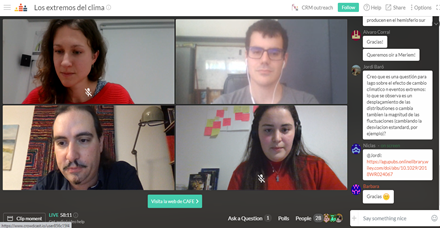CAFE Blog

ESRs and Researchers’ night
On November 27, 2020, Niclas Rieger, Iago Perez, Noémie Ehstand, and I, Meriem Krouma, participated as early-stage researchers of the CAFE project in the European Researchers’ Night. Through this blog, I want to talk about my experience and the collaboration with my colleagues in such an event. The idea was to talk about climate change, weather extremes, and their impact on daily life. The event was to be given in front of children and online: a real challenge!

The network behind weather and climate
What is common about an epidemic, a forest fire and the mobile game Chain Reaction is how the condition of one element influences the other surrounding elements which were in contact with it in some form. Computer science has a popular algorithm named the burning tree algorithm to track this kind of spread.

How hacking can mitigate the impacts of natural hazards
The CAFE Early Stage Researchers Niclas Rieger and Nikolaos (Nikos) Mastrantonas talk about their experiences as participants in the Copernicus Barcelona Hackathon. During this event, they contributed in developing applications that can reduce the negative impacts of natural hazards.
